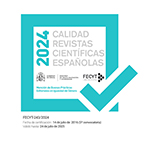Social representation of social expert reports in court judgements. A relevant analysis to forensic social work
Resumen
This article presents a novel contribution in the judicial field through the analysis of the social representation of expert reports in judgments handed down in Spain from 2000 to 2019. Social expert opinions are presented as evidence in judicial proceedings to assist judges in their decision-making, and despite their distinction and contribution, they currently represent an underexplored field. The purpose of this article is relevant in that it allows evidence to be generated through the analysis of the themes or issues that appear in judgments together with the content used by judges to uphold or reject claims. The strategy for this analysis is based on lexicometry using Iramuteq software, which allows us to deepen and categorise the lexical worlds, the type of relationships established between terms, as well as the contextual-relational dimension of the conditions of production of the judges' discourse around the social expert report.
Descargas
Descarga artículo
Licencia
La revista Cuadernos de Trabajo Social, para fomentar el intercambio global del conocimiento, facilita el acceso sin restricciones a sus contenidos desde el momento de su publicación en la presente edición electrónica, y por eso es una revista de acceso abierto. Los originales publicados en esta revista son propiedad de la Universidad Complutense de Madrid y es obligatorio citar su procedencia en cualquier reproducción total o parcial. Todos los contenidos se distribuyen bajo una licencia de uso y distribución Creative Commons Reconocimiento 4.0 (CC BY 4.0). Esta circunstancia ha de hacerse constar expresamente de esta forma cuando sea necesario. Puede consultar la versión informativa y el texto legal de la licencia.









